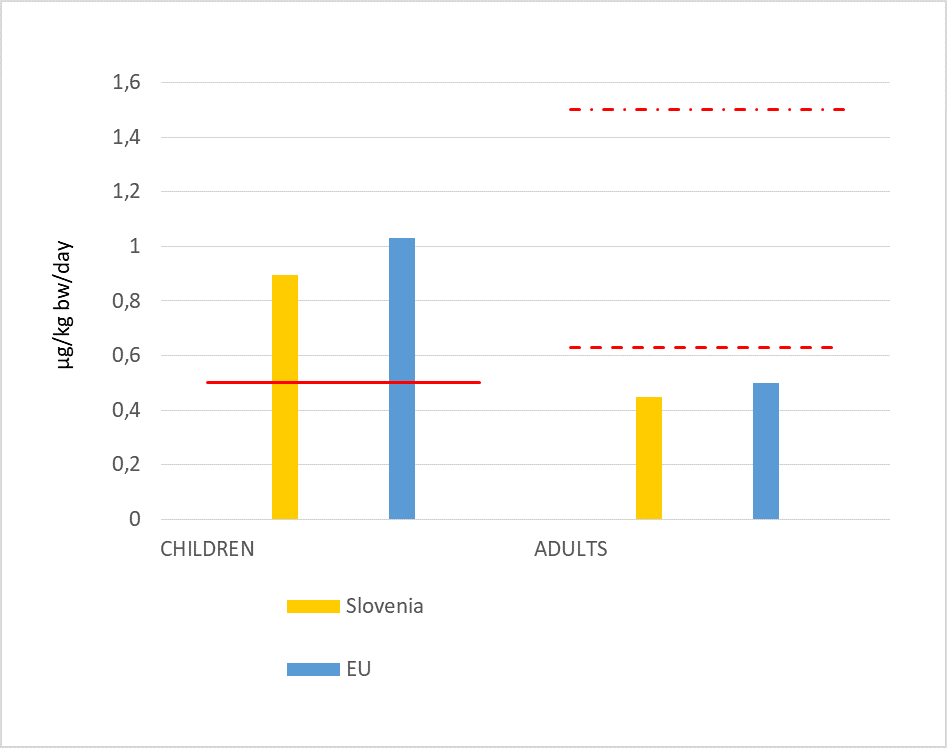[ZD15] Dietary intake of certain metals

Key message

The estimated average long-term intakes of metals (lead, cadmium and mercury) into the human body through food in the adult population of Slovenia do not exceed the reference points (BMDL) or health-based guideline values (tolerable daily/weekly intakes), and in children lead and cadmium on average, similarly to the EU, may be exceeded. It is necessary to constantly raise awareness of the population for a healthy nutrition, including the implementation of measures to reduce the intake of toxic metals, especially in children and pregnant women, both from food and other environmental sources and to continue official control/monitoring of metals in food on the Slovenian market.
Charts
Reports on the implementation of individual tasks related to official control performed by the competent authorities (from 2013 onwards The Administration for Food Safety, Veterinary Sector and Plant Protection of the Republic of Slovenia - UVHVVR) for the period 2011 - 2016; Kirinčič et al., 2019. (3. 09. 2020)
| Food categories | Unit | Grains and products | Vegetables and products | Starchy roots and tubers | Legumes, nuts, oilseeds | Fruit and fruit products | Meat and edible offal | Fish and seafood | Milk and dairy products | Eggs and products | Sugar and confectionary | Fats and oils | Fruit and vegetable juices | Non-alcoholic beverages | Alcoholic beverages | Drinking water | Herbs, spices and condiments | Food for children | Special nutritional products | Composite food | Snacks, desserts, other foods |
| Slovenia | mg/kg | 0,022 | 0,028 | 0,012 | 0,018 | 0,014 | 0,052 | 0,040 | 0,002 | 0,038 | 0,010 | 0,018 | 0,013 | 0,001 | 0,022 | 0,014 | 0,383 | ||||
| EU | mg/kg | 0,029 | 0,061 | 0,019 | 0,034 | 0,015 | 0,096 | 0,058 | 0,010 | 0,012 | 0,038 | 0,020 | 0,010 | 0,013 | 0,021 | 0,006 | 0,224 | 0,012 | 0,701 | 0,036 | 0,026 |
Reports on the implementation of individual tasks related to official control performed by the competent authorities (from 2013 onwards The Administration for Food Safety, Veterinary Sector and Plant Protection of the Republic of Slovenia - UVHVVR) for the period 2011 - 2016; Kirinčič et al., 2019. (3. 09. 2020)
| Food categories | Unit | Grains and products | Vegetables and products | Starchy roots and tubers | Legumes, nuts, oilseeds | Fruit and fruit products | Meat and edible offal | Fish and seafood | Milk and dairy products | Eggs and products | Sugar and confectionary | Fats and oils | Fruit and vegetable juices | Non-alcoholic beverages | Alcoholic beverages | Drinking water | Herbs, spices and condiments | Food for children | Special nutritional products | Composite food | Snacks, desserts, other foods |
| Slovenia | mg/kg | 0,038 | 0,025 | 0,037 | 0,046 | 0,006 | 0,087 | 0,117 | 0,001 | 0,042 | 0,00007 | 0,018 | 0,012 | 0,056 | |||||||
| EU | mg/kg | 0,027 | 0,051 | 0,020 | 0,192 | 0,004 | 0,137 | 0,105 | 0,006 | 0,003 | 0,030 | 0,005 | 0,004 | 0,002 | 0,001 | 0,00021 | 0,050 | 0,008 | 0,075 | 0,031 | 0,017 |
Reports on the implementation of individual tasks related to official control performed by the competent authorities (from 2013 onwards The Administration for Food Safety, Veterinary Sector and Plant Protection of the Republic of Slovenia - UVHVVR) for the period 2011 ? 2016; Kirinčič et al., 2019. (3. 09. 2020)
| Age group | Unit | TODDLERS | ADULTS |
| Slovenia | μg/kg bw/day | 0,896 | 0,448 |
| EU | μg/kg bw/day | 1,03 | 0,50 |
| BMDL01 - developmental neorotoxicity in young children | μg/kg bw/day | 0,50 | 0,50 |
| BMDL10 - nephrotoxicity in adults | μg/kg bw/day | 0,63 | 0,63 |
| BMDL01 - cardiovascular effects in adults | μg/kg bw/day | 1,50 | 1,50 |
Reports on the implementation of individual tasks related to official control performed by the competent authorities (from 2013 onwards The Administration for Food Safety, Veterinary Sector and Plant Protection of the Republic of Slovenia - UVHVVR) for the period 2011 ? 2016; Kirinčič et al., 2019. (3. 09. 2020)
| Age group | Unit | TODDLERS | ADULTS |
| Slovenia | μg/kg bw/week | 4,65 | 2,27 |
| EU | μg/kg bw/week | 3,96 | 1,70 |
| TWI - kidney effects | μg/kg bw/week | 2,50 | 2,50 |
Reports on the implementation of individual tasks related to official control performed by the competent authorities (from 2013 onwards The Administration for Food Safety, Veterinary Sector and Plant Protection of the Republic of Slovenia - UVHVVR) for the period 2011 - 2016; Kirinčič et al., 2019. (3. 09. 2020)
| Food categories | Unit | CHILDREN | ADULTS |
| Grains and products | % | 26,41 | 20,95 |
| Vegetables and products | % | 10,42 | 10,25 |
| Fruit and fruit products | % | 0,00 | 7,14 |
| Milk and dairy products | % | 11,71 | 0,00 |
| Fruit and vegetable juices | % | 8,80 | 0,00 |
| Non-alcoholic beverages | % | 6,37 | 13,82 |
| Composite food | % | 0,00 | 10,05 |
| Other | % | 36,28 | 37,78 |
Reports on the implementation of individual tasks related to official control performed by the competent authorities (from 2013 onwards The Administration for Food Safety, Veterinary Sector and Plant Protection of the Republic of Slovenia - UVHVVR) for the period 2011 - 2016; Kirinčič et al., 2019. (3. 09. 2020)
| Food categories | Unit | CHILDREN | ADULTS |
| Grains and products | % | 29,11 | 22,87 |
| Vegetables and products | % | 11,50 | 11,99 |
| Starchy roots and tubers | % | 9,39 | 10,28 |
| Fish and seafood | % | 9,98 | 13,24 |
| Milk and dairy products | % | 9,47 | 0,00 |
| Composite food | % | 0,00 | 9,67 |
| Other | % | 30,53 | 31,95 |
Reports on the implementation of individual tasks related to official control performed by the competent authorities (from 2013 onwards The Administration for Food Safety, Veterinary Sector and Plant Protection of the Republic of Slovenia - UVHVVR) for the period 2011 - 2018; EFSA, 2012c. (3. 09. 2020)
| Food categories | Unit | Slovenia | EU |
| Fish (meat) | µg/kg | 60 | 53 |
| Processed or canned fish | µg/kg | 46 | 22 |
Reports on the implementation of individual tasks related to official control performed by the competent authorities (from 2013 onwards The Administration for Food Safety, Veterinary Sector and Plant Protection of the Republic of Slovenia - UVHVVR) for the period 2011 ? 2018; EFSA, 2012c. (3. 09. 2020)
| Age group | Unit | TODDLERS | ADULTS |
| Slovenia | μg/kg bw/week | 0,19 | 0,27 |
| EU | μg/kg bw/week | 0,07 | 0,24 |
| TWI - developmental neurotoxicity | μg/kg bw/week | 1,3 | 1,3 |









